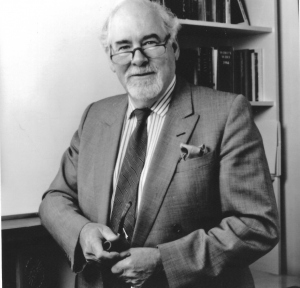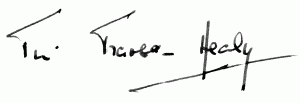This post is part of The Plank Center’s Legacies from Legends in PR Series that was begun in recognition of the 40th Anniversary of the Public Relations Student Society of America in 2007.
Director, Centre for Public Affairs Studies. Officer Order of the British Empire; Fellow of the Royal Society of Arts; IPRA College Emeriti, chairman, 2006; president of the Institute for Public Relations, 1967-68, (Founder Member 1948, Fellow 1956); vice president, European PR Federation, 1965-69; president, International Public Relations Association, 1968-73, (Founder Secretary 1950-61); Arthur W. Page Society Hall of Fame Award, 1990; Royal Marines Commandos and Special Forces, World War II; Hon. Col./ACF/PR 2001.
In the immediate post World War II years, as the young acting secretary of the provisional committee of the embryonic International Public Relations Association, I was privileged to learn directly from this comparatively small band, drawn from a number of different countries and cultures, what they believed were the social and moral values underpinning the work of the public relations specialist.
They were exercised as to the beneficial contribution which we could make to the Brave New World we all earnestly envisaged would emerge. To these modernist pioneers, public relations was not advertising, not press agentry, not publicity or propaganda and not promotion. Rather, it was a philosophy–an attitude of mind based upon the tenet that what people truly thought really mattered and should dictate the course of events.
To them–and indeed to me–to be accurately described as public relations, an activity has to contain three elements in almost equal quantities: truth, concern of the public or general interest and dialogue. And, whereas truth and concern for the public interest were variables determined by individual or corporate conscience, dialogue was not. It was either taking place, or it was not, and in any event was measurable.
In the opinion of this group, contact was essential to dialogue; information was the currency of contact; and controversy the price that had to be paid for the gain of trust and tolerance. They believed that true dialogue, coupled with effective communication, would help eliminate or alienate conflict between groups.
To them, the assertion that we were like lawyers, acting as either prosecutors or defenders depending on who commissioned our services first, was an untenable argument. What mattered when offering our services were the merits of the specific case, the worthiness of the cause, the record of the concern.
These were men who had experienced personally the horrors and miseries of war and witnessed the evils of unscrupulous propaganda. They recognized the manipulative methods of the spin-doctors well before the title was invented. They outlawed them and their practices, believing that we should dedicate our efforts to the presentation of a balanced picture of the institutions and organizations we represented as executives or counselors.
They did not envisage that the term, title and territory of professional public relations would be invaded and inhabited by marketers, publicists, propagandists and promoters.
By today’s standards, perhaps idealist? Yes. But, will history say they were wrong?
